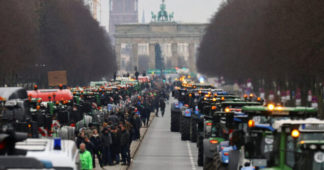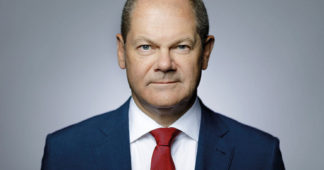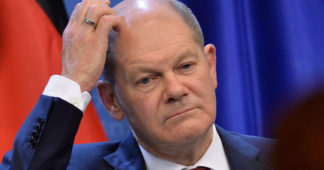By Harri Gruenberg
The unpopular traffic light coalition in Berlin, which called itself a “progressive government,” has collapsed. The coalition was a war government, and it led the German economy into freefall due to its sanctions policy against Russia. Its policy of rearmament and economic warfare was carried out at the expense of the vast majority of the working population, the trades, and the middle class. It actively curtailed freedom of expression, as seen in the recent Bundestag resolution on antisemitism.
Democratic and social achievements were rolled back to an unprecedented extent under the traffic light coalition. It called itself a “progressive coalition” but only managed to serve the interests of a narrow elite. Its policies have fueled the rise of the far right in Germany.
The traffic light government is at the forefront of preparing for a new imperialist war against Russia. The Social Democratic Defense Minister Pistorius predicts that by the end of this decade, there will be a major war with Russia. The head of the CDU (Christian Democratic Union) has called for an ultimatum to Russia, advocating the use of all weapons to strike at Russia deeply, even attacking Moscow itself.
This is madness and it means nuclear war. The traffic light coalition has not failed because of the war question, nor because of whether the NATO proxy war against Russia should continue and escalate. All three parties in the coalition are clear that the NATO proxy war in Ukraine must go on. They also want to continue supporting the Israeli genocide in Gaza. The traffic light coalition has failed due to its inability to agree on financing the war. The FDP (Free Democratic Party), in coalition with the CDU, wants to finance the war by cutting the welfare state and redirecting funds from social spending. The SPD (Social Democratic Party) and the Greens see this as a threat to social stability and want to make moderate cuts to social services, which they have already begun.
This was made clear in Chancellor Olaf Scholz’s (SPD) statement on the dismissal of Finance Minister Christian Lindner (FDP). Scholz said he was not willing to finance “support for Ukraine and investments in our defense at the expense of social cohesion.” However, the reality is that for almost three years, we have been paying the price for the wars and economic wars that his government has pushed forward in close cooperation, through rising energy and food prices, crumbling infrastructure, and cuts in education, social services, and many other areas. This policy is also accepting the announced mass layoffs, particularly in the automotive and supplier industries.
In the upcoming federal election, the issues of war and peace will be at the forefront. The preservation of the welfare state will be at stake. Now, it is crucial to strengthen those forces that will show the red card to the war policies and the resulting attacks on the welfare state by the SPD, CDU, Greens, and FDP, and to pursue a consistent peace policy.
The goal is to stop the imperialist course of the Western powers toward a world war. It is also necessary to resist the deindustrialization of Germany.
We need to be clear about the dangerous situation we are in. Germany is at the forefront of preparations for war against Russia and China. After several decades in which post-war Germany portrayed itself as a champion of peace, it is now preparing for war once more. This is at the heart of Chancellor Scholz’s “turn of the era.” A turn towards war preparations and a war economy.
To counter this, we need partners in trade unions and political parties that are against the war. We need mass movements on the streets against the war course. In this federal election campaign, only the BSW (Alliance Sahra Wagenknecht) will warn against the dangers of a new world war unleashed by imperialism. The BSW is the only political force in Germany that clearly states that war and war preparations will sweep away the welfare state. All social and democratic achievements of the working class are at stake, as the CDU and FDP want to finance the war course by dismantling the welfare state.
This is the great crisis of capitalism, which today takes the form of the decline and exhaustion of the neoliberal, globalized model, leading to war. In Germany’s case, the era of stable development based on cheap resources from Russia is over. But German imperialism still needs Russian raw materials as air to breathe. The recent aggressiveness of German imperialism stems from its readiness to go to war over the raw materials of Russia and Ukraine. This is in line with Jean Jaurès’s statement on the eve of World War I: “Capitalism carries war within it like a cloud carries rain.”
These are the deeper causes of the impending imperialist war. The neoliberal, globalized capitalist model is at an impasse. After the failure of the Keynesian model of capitalism, it was supposed to reverse the tendency of the falling rate of profit, provide more profits, and stabilize global capitalism. But this no longer works, and neoliberal globalized capitalism is in economic decline. This is also evidenced by the rebellion of the global South against neoliberal globalization.
German capitalism, in particular, is affected by the crisis. Its success model for many years was the cheap raw materials from Russia. It built up the productivity of its economy, which made it the leader in Europe, while crushing the rest of Europe and dominating it. German imperialism is hungry for cheap raw materials to stop its decline. The decline of German capitalism is symbolized by the crisis at Volkswagen. 30,000 employees are to be laid off, and three production sites in Germany will be closed. A total of 145,000 jobs in the automotive industry— the backbone of German manufacturing— are at risk.. This is due to a loss of competitiveness driven by soaring energy prices.
The SPD and the Greens will continue to stand with the warmongers. Although it is already clear that Scholz intends to present himself as a “peace chancellor” in the federal election campaign, the CDU and FDP, who recently called for the delivery of Taurus missiles, will push for an escalation of the war.
Only the alliance of Sahra Wagenknecht offers an alternative to the war course of German imperialism. To thwart German imperialism, the Sahra Wagenknecht alliance must be strengthened. Only Wagenknecht’s formation advocates for an immediate ceasefire without preconditions, opposes economic warfare, and stands against sanctions on Russia. Sahra Wagenknecht sharply opposes the deindustrialization of Germany. Some confused leftists believe that deindustrialization does not concern the working class, as it only affects corporate profits. The truth, however, is that deindustrialization goes hand in hand with mass misery. A true social-populist left cannot be indifferent to the fact that parts of the working class are being pushed into misery.
But a smear campaign against the Sahra Wagenknecht alliance is being run by the Left Party in Germany, with support from other left-wing parties in Europe, especially the French Communists, accusing the BSW of being right-wing. The criticism mainly revolves around the BSW’s migration policy, which does not align with the left-liberal stance because it opposes unlimited migration and the policy of open borders for all.
Since the U.S. socialist Bernie Sanders, who is a member of the Democratic Party, is often cited as a reference point by the left-liberals, here is a quote from 2016, when he was running for president as a Democratic candidate. Unlike the majority of Democrats, the left-wing senator Bernie Sanders had the courage to address the economic interests behind the promotion of migration. He pointed to the Koch brothers, two industrial magnates with a fortune of over $40 billion at the time, who called for a policy of open borders for all. Sanders said: “Open borders? No, that is a proposal from industrial magnates like the Koch brothers. Open borders for all is a right-wing policy in this country. Bring in people who will work for $2 or $3 an hour. That’s great for the rich.”
A true internationalist left politics is not about calling for open borders for all, which actually victimizes people, especially in the global South, under the unleashed globalized capitalism. Rather, internationalism means helping people in their own countries to improve their living conditions, end poverty, and stop exploitation by capitalist metropolises. This is how the BSW approaches the migration issue. The BSW defends the right to asylum, advocates for controlled migration, and fights for the rights of all people living in Germany to good wages, good lives, and good social standards. This is also proven by the fact that many people in Germany with migration backgrounds vote for the BSW because they too do not want the neoliberal migration policy of open borders for all.
We remind our readers that publication of articles on our site does not mean that we agree with what is written. Our policy is to publish anything which we consider of interest, so as to assist our readers in forming their opinions. Sometimes we even publish articles with which we totally disagree, since we believe it is important for our readers to be informed on as wide a spectrum of views as possible.











